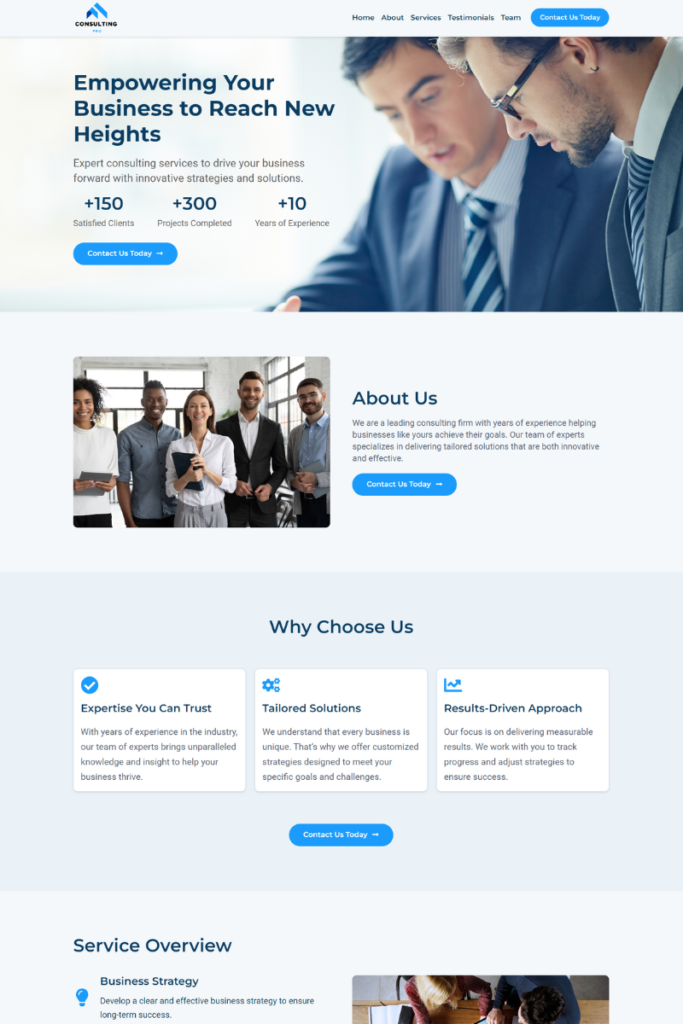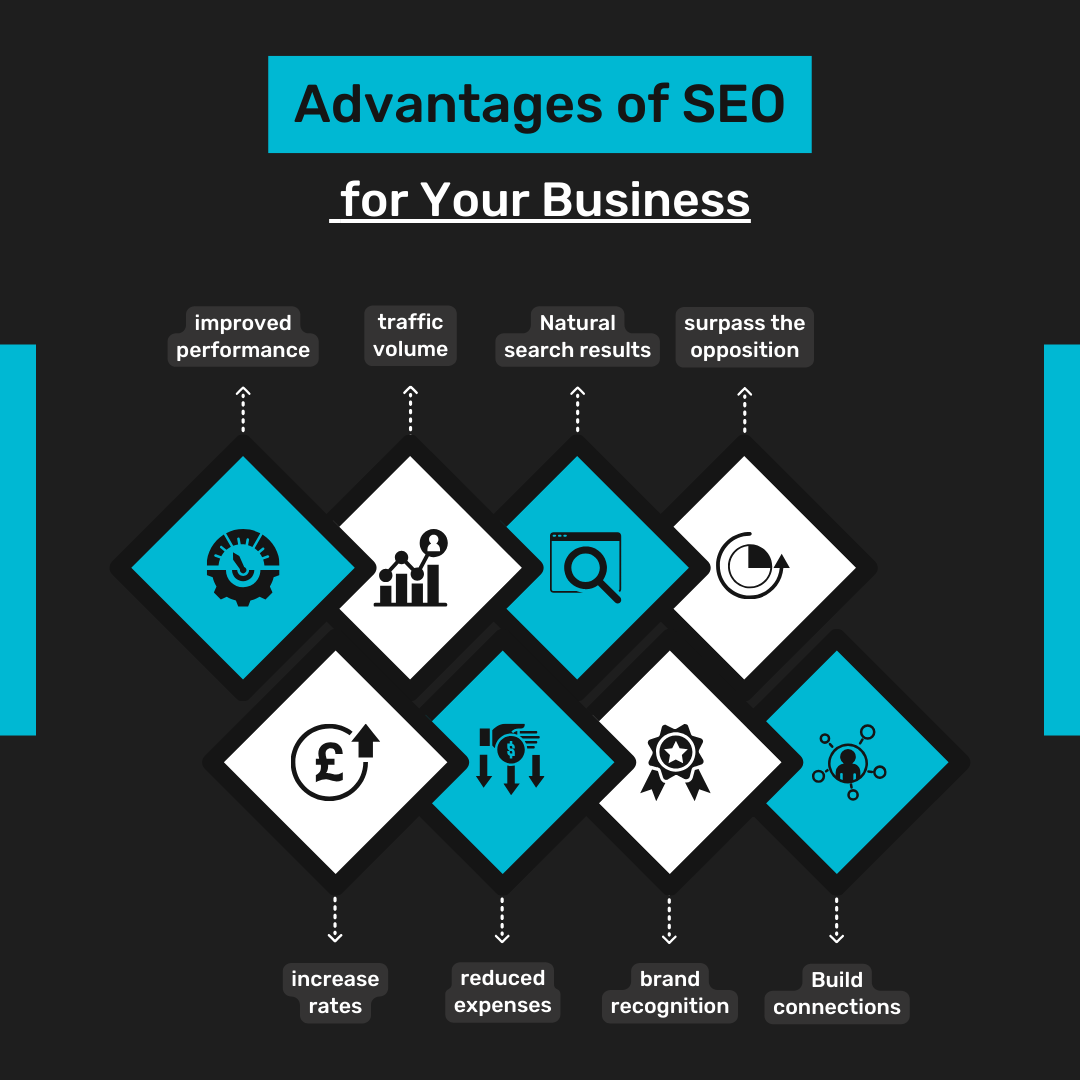- Build credibility with professional look
- Time-Saving and Easy to Customize
- Increase Leads with a Conversion-Optimized Landing Page

- Build credibility with professional look
- Time-Saving and Easy to Customize
- Increase Leads with a Conversion-Optimized Landing Page

Table of Contents
- 1 Introduction
- 2 Why a Professional Website Matters
- 3 Essential Elements of an Effective Website for Consultants
- 4 Optimizing User Experience (UX)
- 5 SEO Best Practices for Website Design for Consulting Firms
- 6 Showcasing Expertise and Building Authority
- 7 Integrating Analytics and Continuous Improvement
- 8 Conclusion
- 9 Final Thoughts
- 10 Free Consulting Business Website Template
Introduction
Imagine a potential client searching online for a consultant to solve their problem. They find your name, click on your website, and what happens next? Does your site immediately convey professionalism and expertise, or does it leave them questioning your capabilities?
I have worked with many consultants who, despite having impressive expertise, struggled to attract clients because their websites did not reflect their true value. Their outdated or unclear websites often caused potential clients to leave before making contact, overshadowing the skills they had worked hard to develop.
This ultimate guide to website design for consulting businesses will help you avoid that pitfall. I will show you how to create a website that looks professional and attracts and retains clients. By the end, you will have the tools to ensure your website reflects the expert you are.
Why a Professional Website Matters
Let us consider James, a seasoned consultant with a wealth of knowledge and a solid track record. Despite his expertise, James noticed a drop in client inquiries. Confused and concerned, he finally received some honest feedback from a client:
“Your website did not give me confidence,” they said. “It looked outdated, and I was not sure if you were still in business.”
This feedback hit James hard. He realized that his website, which he had not prioritized, was actually driving potential clients away.
In today’s world, your website is often the first impression clients get. A well-designed site shows that you are serious, current, and trustworthy. It is not just about aesthetics; it is about setting the right tone from the start.
James’s experience is a powerful reminder: Your website is a key part of your business strategy. A professional site enhances credibility, builds trust, and can be the deciding factor in whether you gain or lose a client.
Understanding the importance of a strong online presence is crucial for any consulting firm. To explore this topic further, check out our detailed post on Why Consulting Firms Need a Strong Online Presence.

Essential Elements of an Effective Website for Consultants
A well-designed consultant website should include several key components that help communicate your value and convert visitors into clients. Here is what you need to focus on:
Clear and Compelling Homepage
Your homepage is the first impression visitors will get. It should immediately communicate who you are, what you offer, and how you can help. Include a concise headline, a brief overview of your services, and a clear call to action that guides visitors to take the next step.
Service Pages
Each of your services should have a dedicated page that provides detailed information. Clearly explain what each service involves, who it is for, and how it benefits the client. Use simple language and visuals to make these pages informative and easy to understand.
- About Page
The About page is crucial for building trust. Share your background, expertise, and what sets you apart from other consultants. This is also a great place to include your professional photo and a brief introduction to your team, if applicable.
- About Page
Client Testimonials
Testimonials are powerful tools for building credibility. Include quotes from satisfied clients that highlight the results you have helped them achieve. Ensure these testimonials are prominently displayed throughout your site, especially on the homepage and service pages.
Call to Action (CTA)
Effective CTAs are essential for converting visitors into leads. Use clear, action-oriented language that guides visitors toward taking the next step—whether that is scheduling a consultation, signing up for a newsletter, or downloading a resource.
According to a study by HubSpot, websites that incorporate clear CTAs see a significant increase in conversions.
Portfolio or Case Studies
Showcasing your past work through a portfolio or case studies helps demonstrate your expertise and the results you have achieved for other clients. Include detailed examples that highlight your problem-solving skills and the impact of your services.
Blog or Thought Leadership Content
Regularly updated content, such as blog posts or articles, can position you as a thought leader in your field. This not only provides value to your visitors but also helps with SEO by keeping your site fresh and relevant.
Mobile-Friendly Design
Ensure your website is fully responsive and works well on all devices, especially mobile. A significant portion of web traffic comes from mobile users, so a site that is not optimized for mobile can lead to lost opportunities.
For more on mobile responsiveness, see Google’s mobile-friendly guidelines.

By incorporating these essential elements, you will create a website that effectively communicates your value, builds trust with potential clients, and drives your consulting business forward.
Check out my portfolio to see how we’ve helped other consultants build effective websites.
Optimizing User Experience (UX)
Creating a seamless user experience is key to keeping visitors engaged and guiding them smoothly through your website. If you want to dig deeper into the basics, check out this great guide on UX design principles from Baymard. Here are the essential UX principles to focus on:
Intuitive Navigation
Ensure your site’s navigation is straightforward. Visitors should be able to find what they are looking for with minimal clicks. Use clear labels for your menu items and maintain a consistent layout across all pages.
Responsive Website Design for Consulting Businesses
Your website must be fully responsive, meaning it adapts well to all screen sizes, from desktops to smartphones. A responsive design improves usability, making it easier for visitors to interact with your site on any device.
Readable Content
Ensure your content is easy to read by using a clean, legible font and proper spacing. Break up large blocks of text with headings, bullet points, and visuals to improve readability and keep visitors engaged.
Fast Loading Times
Speed is crucial for user experience. Optimize images, minimize code, and use reliable hosting to ensure your site loads quickly. Slow loading times can frustrate visitors and lead to higher bounce rates.
Clear Visual Hierarchy
Organize your content with a clear visual hierarchy. Highlight important information, such as CTAs or key messages, using larger fonts, contrasting colors, or strategic placement. This helps guide visitors’ attention and enhances overall usability.
SEO Best Practices for Website Design for Consulting Firms
To ensure your website ranks well on search engines and attracts organic traffic, it is essential to implement SEO best practices. Here is how:
Keyword Research
Identify relevant keywords that potential clients are searching for. Focus on terms related to your services and expertise. Incorporate these keywords naturally into your website content, including headings, body text, and meta descriptions.
On-Page SEO
Optimize individual pages by using keywords in strategic places such as titles, headers, and alt text for images. Ensure your URLs are clean and descriptive, and that each page has a unique meta description that includes your target keywords.
Quality Content
Regularly publish high-quality content that addresses the needs and interests of your target audience. This not only helps with SEO but also establishes your authority in your field. Aim for content that is informative, relevant, and engaging.
Internal Linking
Use internal links to connect related content on your site. This not only helps visitors find more of your content but also improves the structure of your site for search engines, boosting your SEO.
Technical SEO
Ensure your website is technically sound. This includes having a secure (HTTPS) site, a clean and crawlable site structure, and a sitemap submitted to search engines. Regularly check for broken links and other issues that could harm your SEO efforts.
By following these practices, you will improve your website’s visibility on search engines, attract more organic traffic, and ultimately gain more clients.
For professional help with SEO, explore my SEO services.

Showcasing Expertise and Building Authority
Imagine a potential client visiting your website, unsure if you are the right consultant for their needs. As they browse, they come across a detailed case study that outlines how you solved a problem similar to theirs. Instantly, their hesitation fades—they see you not just as a service provider, but as an expert who can deliver real results.
To build this kind of authority, it is crucial to showcase your expertise effectively on your website. Here is how:
Case Studies
Highlight specific examples of your work through case studies. Detail the challenges faced by a client, the solutions you provided, and the successful outcomes. This demonstrates your problem-solving abilities and provides proof of your impact.
Portfolio
A well-organized portfolio showcases your best work. Include projects that reflect the range and depth of your skills, along with brief descriptions that explain your role and the results achieved. This helps potential clients see the quality and relevance of your experience.
Thought Leadership Content
Position yourself as a thought leader by regularly publishing articles, whitepapers, or blog posts that address industry trends, insights, or common client challenges. Sharing your knowledge through valuable content helps establish you as an authority in your field.
Speaking Engagements and Media Features
If you have spoken at conferences, appeared in media, or been featured in industry publications, showcase these accomplishments on your site. This kind of exposure adds credibility and reinforces your status as an expert in your niche.
Client Testimonials
Incorporate testimonials that speak to your expertise and the positive outcomes you have delivered. Testimonials from well-known or highly regarded clients can be particularly powerful in building trust and authority.
By effectively showcasing your expertise through these methods, you will build a strong reputation as an authority in your field, making it easier to attract and convert potential clients.
Integrating Analytics and Continuous Improvement
Understanding how your website performs is essential to making informed decisions that make it more effective. By using data, you can find areas that need improvement and keep your site running smoothly. Here is how to approach it:
Set Up Tracking Tools
Start by using tools like Google Analytics to see how well your website is doing. These tools show you important information, such as where visitors come from and what they do on your site, so you can understand how people use it.
To track your website’s performance, use Google Analytics, a powerful tool for understanding visitor behavior.
Watch Important Numbers
Pay attention to key numbers, like how long visitors stay on your site, how many pages they view, and how quickly they leave. These numbers help you see if your content and design are working well.
Understand Visitor Behavior
Use tools that show you where visitors click, scroll, or leave your site. This helps you spot any issues in the way your site works and find ways to make it easier for visitors to use.
Test Different Ideas
Regularly try out different versions of your pages, such as changing headlines or images, to see what works best. Testing these ideas helps you make choices based on what your visitors prefer, leading to better results.
By following these steps, you will keep your website effective, easy to use, and aligned with your business goals.

Conclusion
Creating an effective website design for consulting businesses is more than just a design task—it is a strategic effort that can significantly impact your success. From crafting a professional homepage to optimizing for lead generation, each element of your site plays an important role in building trust, showcasing your expertise, and converting visitors into clients.
As you have learned in this guide, a well-structured website is essential for establishing credibility and driving business growth. By focusing on the key components outlined here, you will be equipped to create a site that reflects your professional image and delivers tangible results.
Do not underestimate the power of a strong online presence. Your website is a vital tool in your consulting toolkit, and with the right approach, it can help you achieve your business objectives.
Final Thoughts
Remember, your website is often the first point of contact for potential clients, and it is your chance to make a lasting impression. Take the time to refine your site, ensuring it truly represents the expert you are and meets the needs of your audience.
If you are feeling overwhelmed or unsure where to start, do not hesitate to seek professional help. Sometimes, a fresh perspective can make all the difference. Whether you decide to tackle the updates yourself or partner with a web design expert, the most important thing is to take action.
Your future clients are out there, searching for someone with your expertise. Make sure your website is ready to welcome them and guide them toward working with you.
Ready to improve your website? Contact me for a free consultation.
Free Consulting Business Website Template
- Build credibility with professional look
- Time-Saving and Easy to Customize
- Increase Leads with a Conversion-Optimized Landing Page

- Build credibility with professional look
- Time-Saving and Easy to Customize
- Increase Leads with a Conversion-Optimized Landing Page






